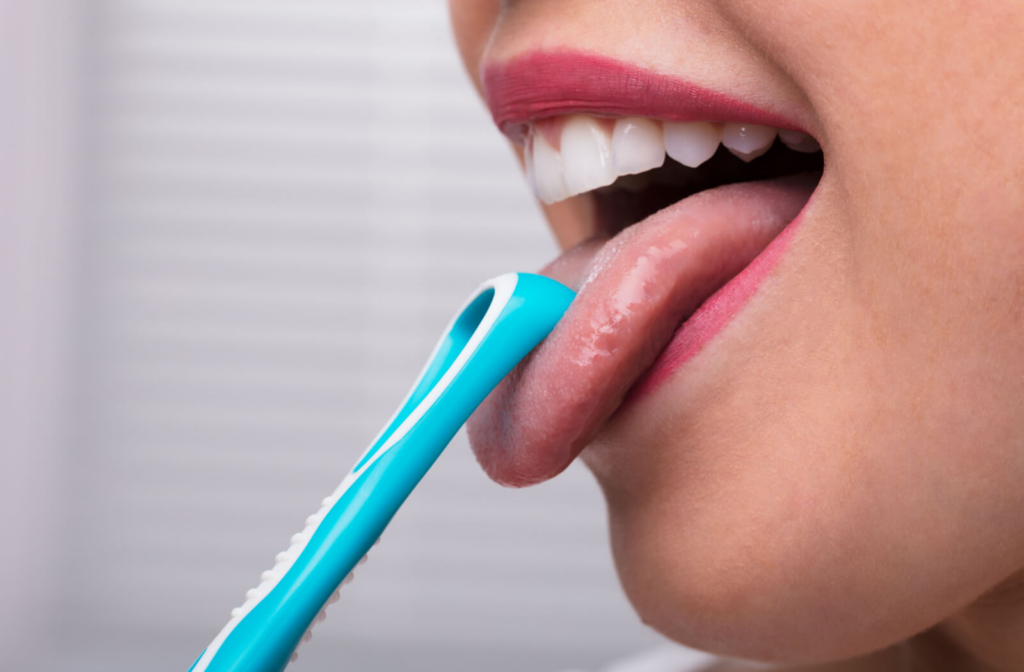Brushing your teeth is about more than keeping your teeth white and preventing bad breath. It’s a significant part of preventing gum disease or gingivitis and cavities.
But did you know you should clean your tongue—not just your teeth? Not only can your tongue contribute to bad breath, but if bacteria accumulates, it can increase your risk of developing cavities or gum disease.
Fortunately, including your tongue in your oral care routine isn’t a difficult thing to do.
Why We Brush & Floss Our Teeth
It’s not enough to see your dentist every six months for a dental exam and cleaning. The Canadian Dental Association (CDA) recommends brushing and flossing your teeth daily. Each of these hygiene components works together to reduce your risk of developing tooth decay, cavities, gum disease, or dealing with discoloured teeth.
Proper and regular brushing and flossing help remove plaque from your teeth before it can harden into tartar—the primary thing responsible for gum disease and tooth decay.
Proper Brushing Techniques
According to the CDA, you should brush at least 2 times daily and floss at least once—preferably after every meal. Neither of these things is complicated, but it’s important to use good techniques to maximize the benefits. Here are a couple of tips to keep in mind:
- Choose a soft-bristled brush with the right size and shape to reach all your teeth.
- Don’t scrub hard because this can cause your gums to recede. Instead, use a gentle circular motion.
- Ensure you get every tooth surface with the brush—cheek-side, tongue-side, and the tops of each tooth.
- Take your time. A thorough brushing should take around 2 to 3 minutes. You could try using a timer or an app to ensure you take the necessary time.
What About Brushing Your Tongue?
The final step the CDA recommends for good brushing is brushing your tongue. But why do we brush our tongues? Don’t the bacteria-fighting ingredients in the toothpaste also kill the germs on your tongue?
If you skip brushing your tongue, the toothpaste may kill some of the bacteria on your tongue. But it will likely only kill the surface layer because the tongue is not a smooth surface.
Taste buds and other tongue structures create small areas for bacteria to accumulate. And a biofilm builds up on your tongue that a simple rinse or contact with toothpaste won’t get rid of.

What Do You Clean Your Tongue With?
You have a couple of options for cleaning your tongue effectively. Many people find it easiest to use their toothbrush since they already brush their teeth twice daily. Here are a few tips for cleaning your tongue effectively with a toothbrush:
- Stick your tongue out as far as you can.
- Start at the back of your tongue with your toothbrush
- Brush your tongue lightly—you don’t want to break the skin—back and forth.
- Spit any saliva that accumulates with the toothpaste.
- Rinse your mouth with warm water afterward.
A tongue scraper is another option for cleaning your tongue if you want to add another tool to your oral care routine. Using it is a little different than using a brush. A few tips to help maximize efficiency include:
- Stick out your tongue as far as possible.
- Apply the rounded end of the scraper as far back as you can. It may be beneficial to start towards the middle and work your way back if you have a strong gag reflex.
- Gently pull the scraper along your tongue towards the front.
- Clean the scraper off with a cloth or tissue after each pull.
- Repeat these steps until you’ve scraped your entire tongue.
- Ensure that you clean the scraper with warm, soapy water and dry it. This helps prevent germ growth on it.
Benefits of a Clean Tongue
Without proper cleaning, bacteria, dead cells, and other debris can build up on your tongue over time. Effective cleaning can benefit your tongue and mouth in several ways:
- Scraping your tongue every time you brush can help reduce the odour-causing bacteria in your mouth. This can help rescue bad breath, also known as halitosis.
- Some older research suggests regular tongue cleaning can allow you to distinguish between bitter, sweet, sour, and salty sensations on the tongue.
- The biofilm that builds up on the tongue can begin changing the colour a bit. Scraping your tongue every day can significantly improve the colour.
- Finally, keeping your tongue clean alongside your teeth and gums can improve the overall health of your tongue and mouth. This can translate into improved taste and appearance and a reduced risk of tooth decay or gum disease.
Talk to Your Dentist About Your Oral Health
Brushing your teeth, flossing, and brushing your tongue are all important parts of maintaining a healthy smile, but these things aren’t magic cure-alls. Including your dentist is important because they can detect potential problems before they require extensive treatment.
For example, once you remove the biofilm from your tongue and it’s still discoloured, that could indicate other problems.
If you have any concerns about the colour of your tongue, or it’s simply time for your 6-month dental exam and cleaning, call us at Arch King West Dental. The professional team can answer your questions and conveniently book you for an exam with one of our dentists.


